#charlotte von mahlsdorf
Explore tagged Tumblr posts
Photo

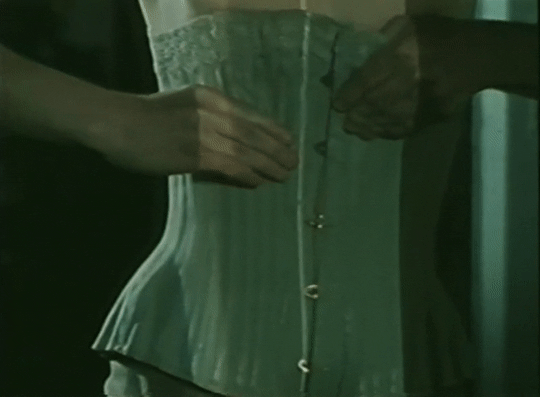
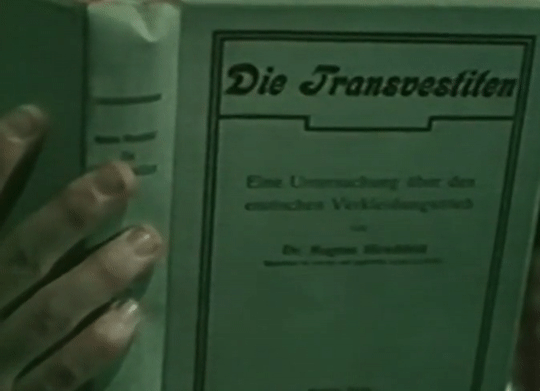
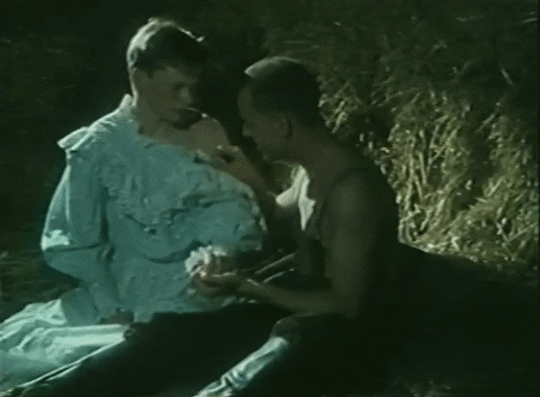
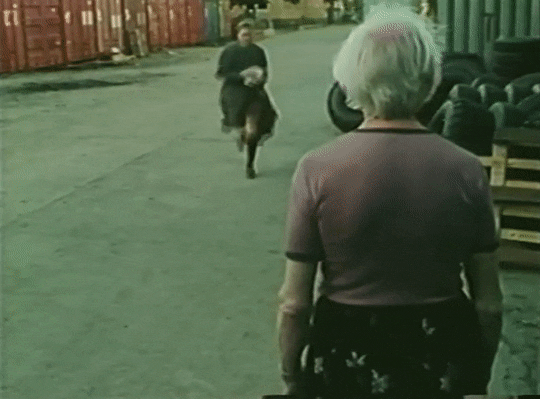
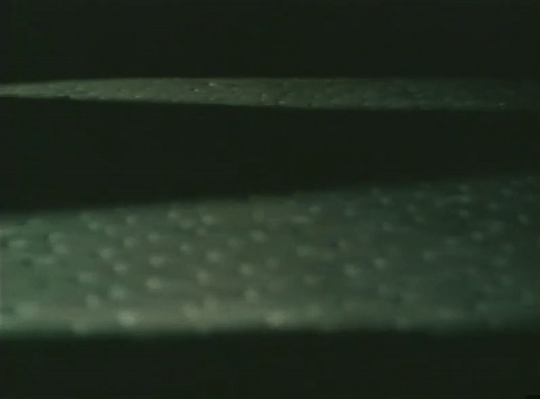




ICH BIN MEINE EIGENE FRAU (1992) dir. Rosa von Praunheim Half dramatization, half documentary, Berlin native and trans activist Charlotte von Mahlsdorf recounts incidents from her eventful life, from surviving the Nazi reign, to enduring the repression in East Germany, to helping start the German queer liberation movement. (link in title)
#lgbt cinema#trans cinema#ich bin meine eigene frau#i am my own woman#german cinema#lgtb#trans#transgender#germany#charlotte von mahlsdorf#rosa von praunheim#lgbt movie#trans movies#german movie#lgbt film#trans film#german film#lgbt media#trans media#queer cinema#european cinema#1992#90s#1990s#1990s movies#1990s cinema#1990s films
124 notes
·
View notes
Text
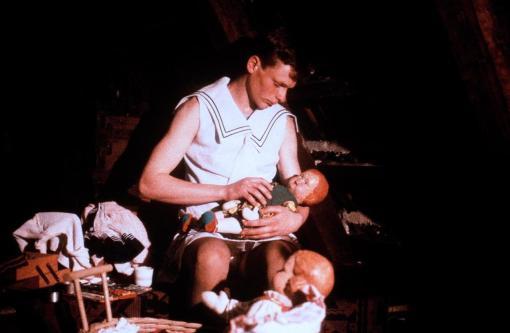

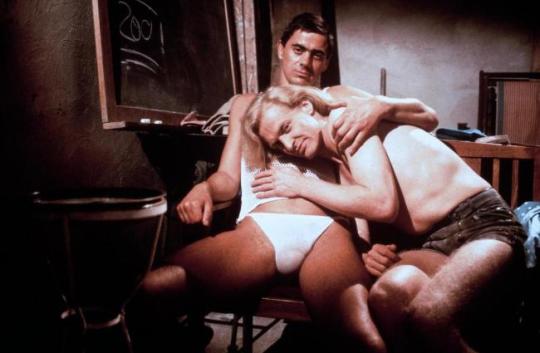

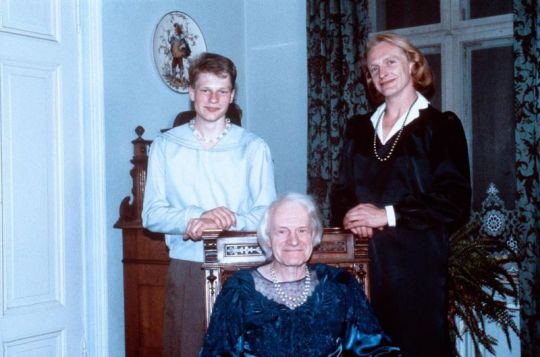
Ich bin meine eigene Frau | I Am My Own Woman (1992) - Rosa von Praunheim
#ich bin meine eigene frau#i am my own woman#rosa von praunheim#charlotte von mahlsdorf#film#watched in st louis#film still#watched in april 2024#lgbtq films#german cinema
8 notes
·
View notes
Text
watched the documentary ich bin meine eigene Frau (I am my own woman) based on the autobiography of charlotte von mahlsdorf, and absolutely wonderful. need to screenshot some of it, but to describe one thing: there was a moment of reenactment where her younger self was having sex with someone who worked at the estate of her great aunt (who had given her the book on transvestites by magnus hirschfeld and said that the two of them should have been born in opposite bodies), and said aunt (using the terminology of the film, an overlap between lesbianism and transmasculinity) is trying to find the worker and is really annoyed
walks in on them having sex and goes "oh i see, carry on" and just leaves again 😂😂😂 i cackled like a witch
#im watching movies#ich bin meine eigene frau#charlotte von mahlsdorf#trans history#trans cinema#queer cinema
2 notes
·
View notes
Text
Archive footage of Randall Nott's final performance as Charlotte Von Mahlsdorf (and 34 others) in "I Am My Own Wife" by Doug Wright on March 24, 2019 at the Martinez Campbell Theater.
0 notes
Text
I read once someone saying that there's two GDR movies about homosexuality, I think it meant the educational film Die andere Liebe (1988), and the theatrical film named Coming Out (1989).
Talking about this, I read this some months ago, that also mentions Charlotte von Mahlsdorf:
Huneke found that during the Cold War era, communist East Germany had more lenient sodomy laws and accepted gay activists’ demands more quickly than its democratic twin. As a result, East Germany contributed significantly to Germany’s pro-gay turn once the country unified in 1990, in some regards more than West Germany did.
West Germany reinstated former Nazis in government and kept the same strict Nazi-era sodomy laws, which criminalized any act perceived to be homosexual, including kissing and touching. As a result, the West German government prosecuted more than 100,000 gay men between 1949 and 1969, of whom over 50,000 were convicted. About the same number of gay people were prosecuted and convicted during the Nazi dictatorship, according to Huneke. East Germany, on the other hand, repealed Nazi-era laws in an effort to be perceived as anti-fascist, and it reverted to the more lenient pre-World War II sodomy law, which only criminalized penetrative sex. And by 1957, East German officials stopped prosecuting consensual adult same-sex relations altogether, Huneke said. “East Germany was sort of stuck between a rock and a hard place,” Huneke said. “On the one hand, it wanted to live up to this anti-fascist legacy, but it was also a brutal dictatorship that didn’t want to appear to be gay-friendly. So they took a reactive approach. In general, they seemed to let gay people be, unless someone who was connected to the regime was accused of being a homosexual.”
aaaalso I found this just now (and more, linking some from the search):
States of (Gay) Liberation in East Germany and West Germany
Shame and Love: East German Homosexuality Goes to the Movies (Kyle Frackman)
The Gay and Lesbian Movement in East Germany: A Timeline of Selected Laws, Events and Activists. Talking about movies:
1971-73: Rosa von Praunheim’s feature film Nicht der Homosexuelle ist pervers, sondern die Situation, in der er lebt is produced in West Germany...


Jstor: Out of the Closet behind the Wall: Sexual Politics and Social Change in the GDR
9 notes
·
View notes
Photo

❤️🧡💛💚 Themenwoche »Queerness in der DDR«💙🤍💜💖 Charlotte von Mahlsdorf, Gründerin des Gründerzeitmuseums in Berlin, rettete viele Objekte (Kunstwerke, Möbel, Alltagsgegenstände aus dem 19. Jahrhundert) vor der Zerstörung und Plünderung während des Zweiten Weltkriegs und der Nachkriegszeit. Das Museum entwickelte sich in der DDR zu einem Ort des kulturellen Austauschs und der Begegnung für queere Menschen, das unter anderem regelmäßig von der HIB (Homosexuelle Interessengemeinschaft Berlin) genutzt wurde. Ihr Buch »Ich bin meine eigene Frau«, in dem sie über ihr Leben als Transgender-Frau in der DDR berichtete, wurde als Theaterstück und Film adaptiert. Sie gilt bis heute als eine wichtige Persönlichkeit im Kampf für Toleranz und Gleichberechtigung in der DDR und darüber hinaus. Wir zeigen euch heute diese Kette aus unserer Sammlung, um uns an sie zu erinnern, denn auf vielen Fotos trägt sie eine Perlenkette. Mehr zur Themenwoche »Queerness in der DDR« gibt’s bei Facebook, TikTok und dem neusten Blogbeitrag des DDR Museum. ❤️🧡💛💚 Theme week »Queerness in the GDR«💙🤍💜💖 Charlotte von Mahlsdorf, founder of the Gründerzeit Museum in Berlin, saved many objects (works of art, furniture, everyday objects from the 19th century) from destruction and looting during the Second World War and the post-war period. The museum developed into a place of cultural exchange and encounter for queer people in the GDR, which was regularly used by the HIB (Homosexuelle Interessengemeinschaft Berlin), among others. Her book »Ich bin meine eigene Frau« (I am my own woman), in which she reported on her life as a transgender woman in the GDR, was adapted as a play and a film. She is still considered an important figure in the fight for tolerance and equal rights in the GDR and beyond. Today we show you this necklace from our collection to remember her, because in many pictures she is wearing a pearl necklace. To find our more about our theme week »Queerness in the GDR«, check out Facebook, TikTok and the latest blog post from the DDR Museum. #ddrmuseums #ddr #gdr #ddrgeschichte #queer #pride #berlin #museum #geschichte #perlenkette #vintage — view on Instagram https://ift.tt/d9K4RPs
6 notes
·
View notes
Text
Respeitar as histórias trans. Diga sim ao talento trans. Chega de transfake!!
Desde a ação no Teatro São Luiz que o casting transfake tem continuado e a reposição da peça sobre Charlotte von Mahlsdorf volta agora a palco: Respeitar as histórias trans. Diga sim ao talento trans. Chega de transfake! 🏳️⚧️
Roubar a história de um povo é uma tática de desumanização dos marginalizados e oprimidos. A maioria das pessoas queer, especialmente as pessoas trans, não conhecem as vidas e as lutas daqueles que vieram antes delas. Esta alienação da história é muitas vezes usada como uma arma contra as pessoas queer, negando a própria condição humana – que tem uma multiplicidade de expressões de género,…
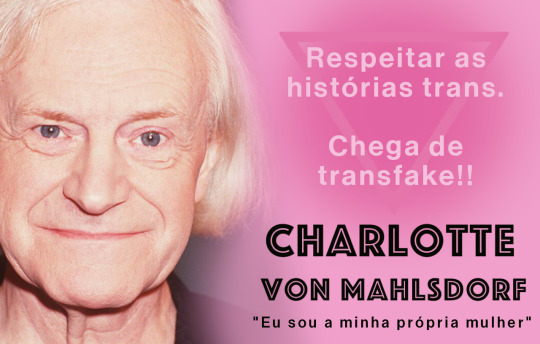
View On WordPress
1 note
·
View note
Text
REVIEW: "I Am My Own Wife" at Hubbard Hall
REVIEW: “I Am My Own Wife” at Hubbard Hall
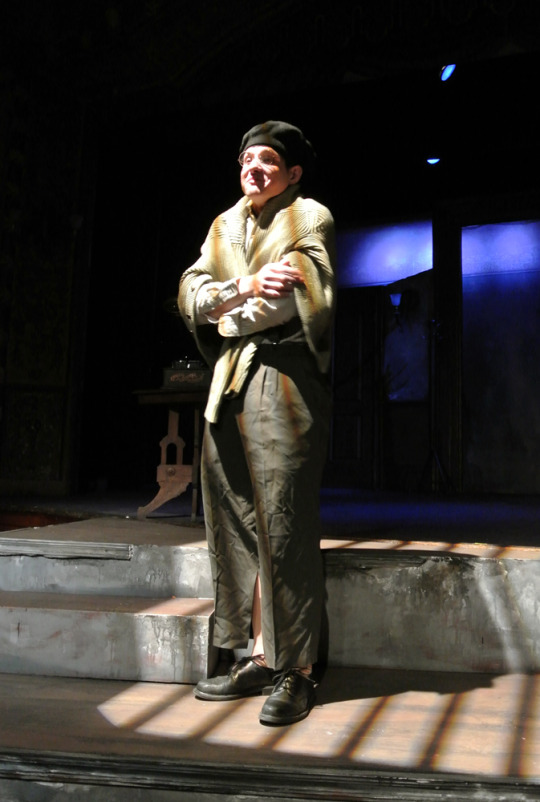
View On WordPress
#Andrea Nice#Cambridge NY#Charlotte von Mahlsdorf#Daniel Salzer#Doug Wright#Hubbard Hall#Hubbard Hall Center for the Arts and Education#I Am My Own Wife#Kristoffer A. Ross#Lothar Berfelde#Roseann Cane#Rylan Morsbach#Trey Morehouse
1 note
·
View note
Photo
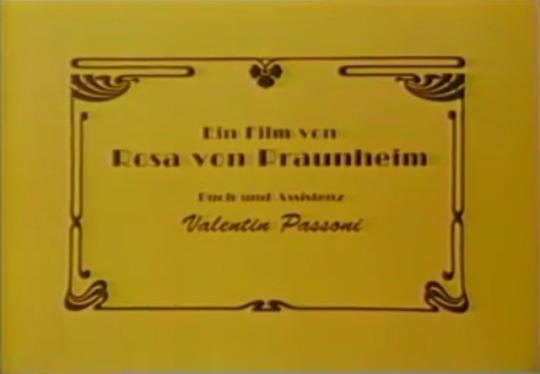
ich bin meine eigene frau (1992)
3 notes
·
View notes
Text
One really funny thing that TERFs are mad at me about is joking that East Germany had a transgender aesthetic, which is a shame because a) it’s true and b) not just an aesthetic - by the last years of the regime they were explicitly more progressive in some ways than West Germany, and the reunified Federal Republic wouldn’t let you legally change your gender without surgery until 2011!
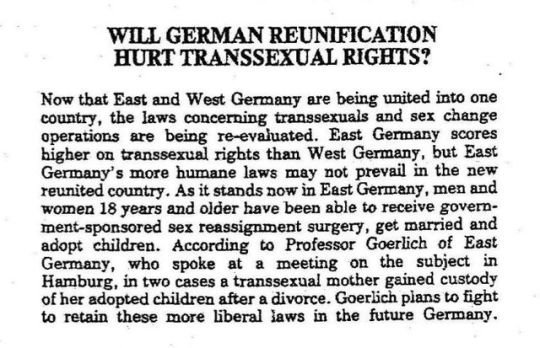
There’s an interesting case study in trans rights in the DDR in the form of Charlotte von Mahlsdorf, who was able to live openly as a trans woman even in the 60s at the price of informing for the Stasi. Given that a lot of people informed for a lot less protection than that, it shows that the authorities were minded to accept LGBT people out of some combination of a sense that they could be controlled politically, were a useful cudgel to attack the west with for their homophobia, and and quite possibly some genuine concern for the betterment of humankind etc etc. after reunification von Mahlsdorf got attacked in the street by neo-Nazis and when she died her family insisted she be buried under her deadname. Like everything about the DDR it is a complex legacy
All of which is to say that I’m going to say more things are transgender and you can’t stop me
730 notes
·
View notes
Text
guys. I went to this tiny museum consisting of a collection of everyday objects from the 18th century with a focus on early music recordings, and the (now deceased) owner of the collection who renovated the whole house basically by herself was a trans woman.
there's a PLAY about her. it ran on broadway! it's called "I am my own wife"!!
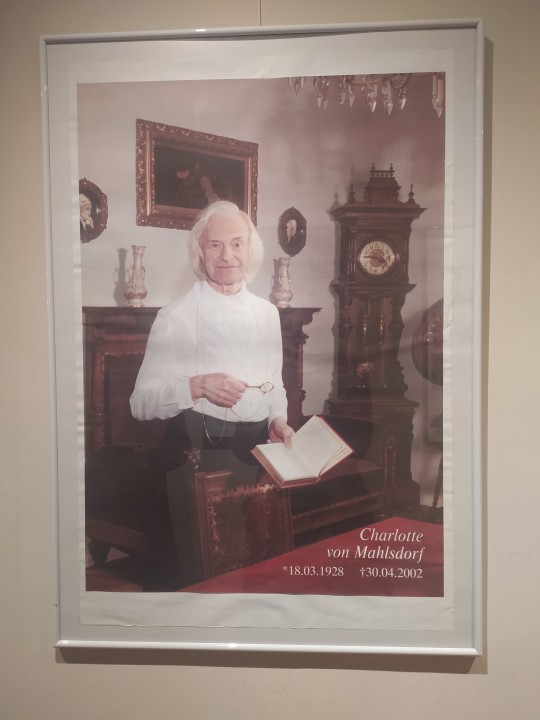
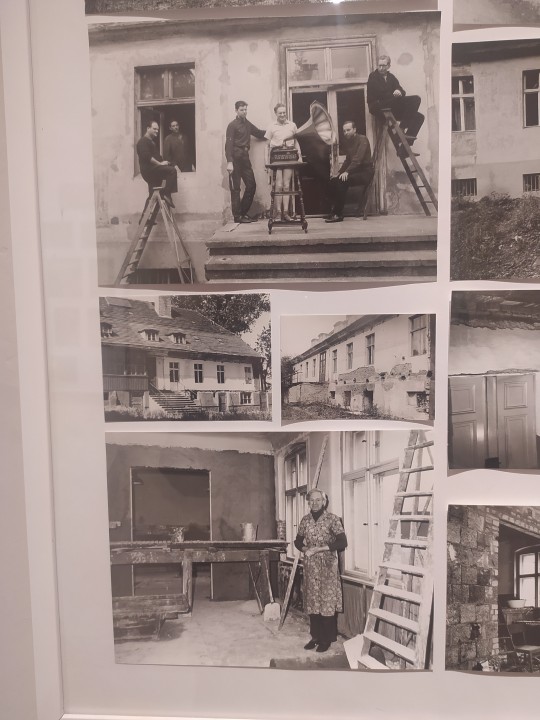
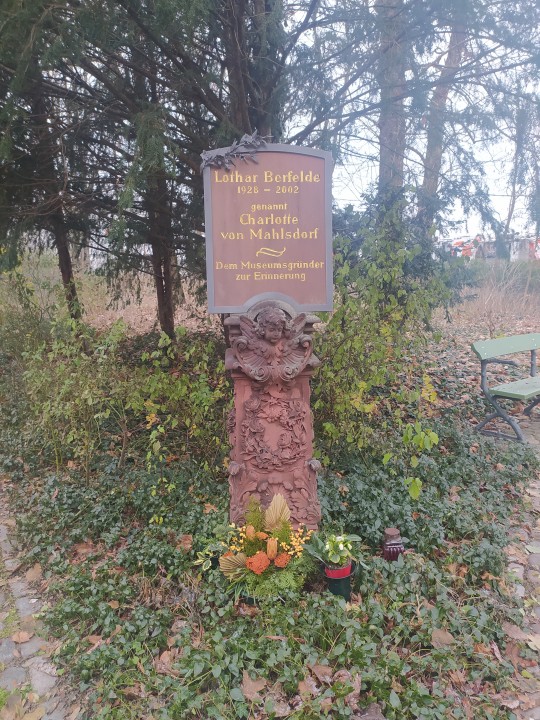
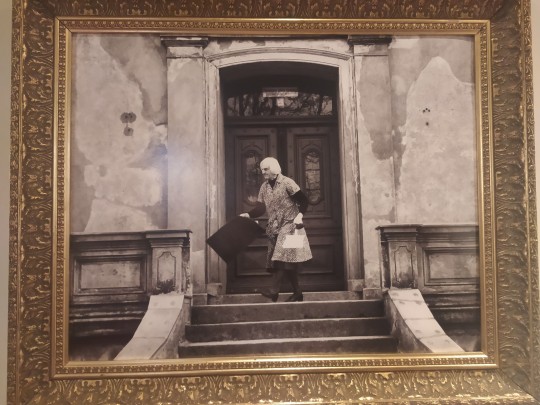
her name was Charlotte von Mahlsdorf. the museum is only open two days a week, and the lady did a whole guided tour just for the two of us. they have a little book out of all the couples who got married there (absolutely beautiful house!). lots of gay weddings :)
#yes i was a little emotional why do you ask lmao#her great uncle took her shopping as a child and bought her a girl's coat. she was accepted by her whole family. except her siblings but!!!#her favourite colour was blue :(( i saw her favourite skirt and coat and the bed she slept in!#history#lgbtq#ahhhh
20 notes
·
View notes
Text
extremely cool that the movie Coming Out (1989) was made and all and it's legitimately a pretty good movie that i would recommend watching even if just because it's historically noteworthy (you can watch it for free from the goethe-institut website here) but wow literally every other queer character in the film is more interesting than the main character. i would rather have watched a movie about basically anyone else in the bar who has a speaking role. it really felt like they wrote the main character to act as a bridge between the straight audience and the queer characters, rather than as a character in his own right with like, a personality that is shown on screen.
i did love that charlotte von mahlsdorf just played herself though. it's cool as hell that she was important enough in east berlin's gay community that she gets featured in the film. trans women rule
23 notes
·
View notes
Text
I spent my time at uni today researching Charlotte von Mahlsdorf and cried about historical trans women and then I came home and continued reading “The Last Girl Scout” by Natalie Ironside and now I’m crying about fictional trans women
#so it's a great day#let me know if there are any more women i should be crying about#I'll work it into my schedule
1 note
·
View note
Photo

Mason Alexander Park as Alice Nutting/Edwin Drood in The Mystery of Edwin Drood
Information
Name: Mason Alexander Park
Credits: Hedwig and the Angry Inch (Hedwig), I Am My Own Wife (Charlotte von Mahlsdorf), The Rocky Horror Show (Frank-N-Furter), Spring Awakening (Moritz)
Color of the rainbow with which they identify: Non-binary (They/them pronouns)
#dreamcast#mason alexander park#the mystery of edwin drood#hedwig and the angry inch#i am my own wife
32 notes
·
View notes
Text
REVIEW: "I Am My Own Wife" at Hubbard Hall
REVIEW: “I Am My Own Wife” at Hubbard Hall
by Roseann Cane
Born Lothar Berfelde in Berlin-Mahlsdorf, Germany, in 1928, the son of a leader of the Nazi Party, Charlotte von Mahlsdorf recognized early in life that she felt more herself in female clothing. Despite her formidable, abusive father, who forced her to join the Hitler Youth, she would become increasingly more comfortable in her sexual orientation, eventually identifying herself as…
View On WordPress
#Andrea Nice#Cambridge NY#Charlotte von Mahlsdorf#Daniel Salzer#Doug Wright#Hubbard Hall#Hubbard Hall Center for the Arts and Education#I Am My Own Wife#Kristoffer A. Ross#Lothar Berfelde#Roseann Cane#Rylan Morsbach#Trey Morehouse
0 notes
